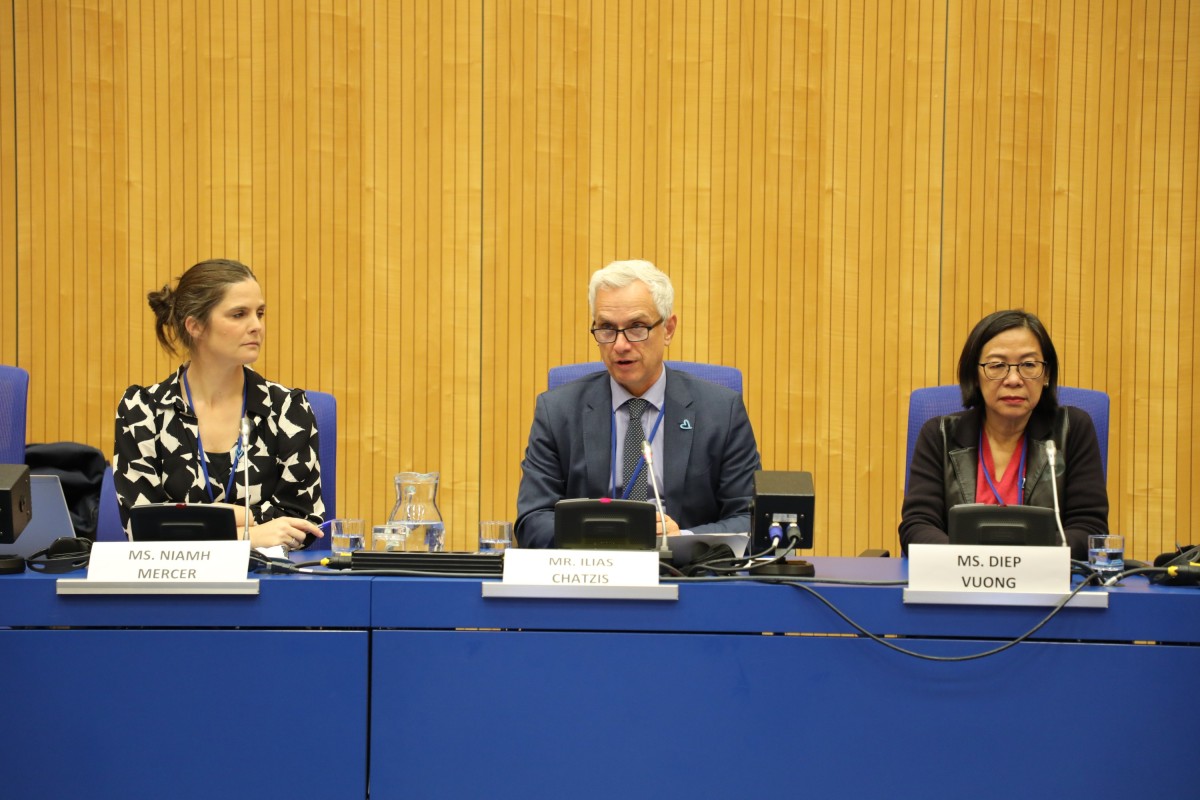To end human trafficking, we must stop paying for it
Vienna

Mr. Ilias Chatzis, Head of UNODC's Human Trafficking and Migrant Smuggling Section, moderating the discussion
The fight to end human trafficking should include consciously not purchasing goods and services produced by exploiting other people.
“If we want to achieve the Sustainable Development Goals, and end human trafficking, we must stop paying for it,” said Mr. Vanja Ostojic, Chief of Procurement at the International Labour Organization (ILO), during the discussion on preventing human trafficking in procurement and supply chains held on 21 October 2022 in the margins of the meeting of States parties to the United Nations Convention against Transnational Organized Crime.
The discussion noted the various efforts being made at national, regional and global levels to prevent human trafficking in procurement and supply chains.
Ms. Nita Zodgekar, International Labour Policy Manager in the New Zealand Ministry of Business, Innovation and Employment, presented the efforts in the country to address labour exploitation with a particular focus on supply chains.
New Zealand is in the process of developing legislation to address exploitation and slavery in supply chains, which will make agencies, especially those with more revenue, accountable for the exploitation in their supply chains.
The proposed legislation includes due diligence provisions consistent with the UN Guiding Principles on Business and Human Rights endorsed by the Human Rights Council in 2011.
The legislation will “require that organizations identify and assess the risk of modern slavery and worker exploitation in their supply chains, identify and implement measures to address and manage any identified risks, and implement systems to periodically evaluate and review the measures that have been taken,” Ms. Zodgekar said.
Ms. Saara Haapasaari, Sustainability Specialist at the European Institute for Crime Prevention and Control, affiliated with the UN (HEUNI), stressed the importance of using public procurement agencies to combat labour exploitation and human trafficking with due diligence.
“By increasing awareness of the risks and providing concrete solutions and support for individual procurement units, agencies can further set criteria and monitor their suppliers and supply chains to protect workers in vulnerable situations, and fight labour exploitation and human trafficking,” she said.
For such efforts to have an impact, “legislation must be up to date and set the minimum ground rules for procurement to consider the risks of different human rights violations,” Ms. Hapaasaari added.
The discussion also received an update on the UN’s efforts to prevent and combat human trafficking in its supply chains. This included the development of a policy framework to guide its procurement processes to consciously prevent human trafficking.
“The approach is risk-based and human-centered to address the root causes of the risks in our supply chains,” said Ms. Niamh Mercer, Chief of Procurement and Contracting, Organization for Security Cooperation in Europe (OSCE), who is also the Co-Chair of the task force established by the UN Procurement Network in 2019 to develop the policy framework.
Meanwhile, a Vietnamese foundation—the Pacific Links Foundation—works with large enterprises, including multinational brands, to prevent worker exploitation, including by improving migrant workers’ knowledge and awareness of the risks of human trafficking, said its President and Co-Founder, Ms. Diep Vuong.
The discussion was co-organized by the Human Trafficking and Migrant Smuggling Section of the United Nations Office on Drugs and Crime (UNODC)—on behalf of the Inter-Agency Coordination Group against Trafficking in Persons (ICAT)—and the European Institute for Crime Prevention and Control, affiliated with the UN (HEUNI). It was moderated by Mr. Ilias Chatzis who heads the Human Trafficking and Migrant Smuggling Section at UNODC.
This follows, among others, the production of policy guidance on the role of public procurement in preventing human trafficking by ICAT in 2021.
*****
About ICAT
ICAT was established in 2007 by the UN General Assembly to enhance cooperation and coordination among UN agencies and other relevant international organizations to facilitate a holistic and comprehensive approach to trafficking in persons. Its members include 31 UN entities and other international organizations. In 2022, ICAT is co-chaired by the United Nations Office on Drugs and Crime (UNODC) and the International Centre for Migration Policy Development (ICMPD).
ICAT has published extensively on trafficking in persons. Its wealth of information can be accessed on the website here.
For more information, follow @ICAT_News on Twitter.
*****


